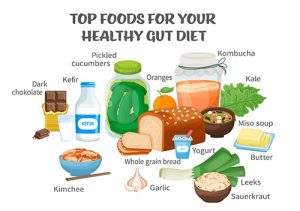When it comes to maintaining optimal gut health, dietary fiber, prebiotics, and probiotics are paramount. These components nourish beneficial bacteria in the gut, promoting overall well-being. A flourishing gut microbiome lays the groundwork for a healthy heart, brain, and immune system, among other vital functions. However, beyond these essentials, there are additional strategies and insights to enhance gut health, as outlined below.
Recognizing Signs of Gut Imbalance
Common gastrointestinal issues such as diarrhea, constipation, bloating, and reflux often  signal an imbalance in the digestive system. Yet, it’s crucial to note that an unhealthy gut can manifest through other symptoms beyond gastrointestinal discomfort.
signal an imbalance in the digestive system. Yet, it’s crucial to note that an unhealthy gut can manifest through other symptoms beyond gastrointestinal discomfort.
Some individuals may experience weakened immunity, frequent illness, or even autoimmune conditions. Additionally, symptoms like fatigue, mood fluctuations, anxiety, and depression may indicate an underlying gut imbalance, underscoring the interconnectedness of gut health with overall well-being.
Foods to Avoid
While consuming gut-supportive foods is key, it’s equally important to steer clear of items that disrupt gut balance. While complete avoidance may not always be feasible, limiting intake of certain foods can mitigate gut-related issues:
that disrupt gut balance. While complete avoidance may not always be feasible, limiting intake of certain foods can mitigate gut-related issues:
- Processed foods
- Refined sugar
- Gluten (especially pertinent for those with celiac disease or sensitivity)
- Dairy products (though natural, unflavoured yogurt can be beneficial)
- Fried foods
- Red and non-organic meats
- Carbonated beverages
- Artificially flavoured and coloured foods
Coffee presents a nuanced consideration for gut health. While it boasts antioxidant properties and may promote efficient waste elimination, excessive consumption can disrupt sleep patterns and aggravate gastrointestinal discomfort. Moderation is key, with a recommended limit of up to four cups daily, ideally consumed earlier in the day to minimize potential disturbances.
Beyond Food: Supporting Gut Health Through Lifestyle Practices
Gut health extends beyond dietary choices to encompass various lifestyle factors. Stress, in particular, poses a significant threat to gut equilibrium, underscoring the importance of stress management strategies. Incorporating practices such as mindful breathing and prioritizing quality sleep can help alleviate stress and foster gut health:
particular, poses a significant threat to gut equilibrium, underscoring the importance of stress management strategies. Incorporating practices such as mindful breathing and prioritizing quality sleep can help alleviate stress and foster gut health:
- Mindful Breathing: Engaging in mindful breathing exercises induces relaxation, offering a gentle massage for internal organs and alleviating gastrointestinal distress.
- Quality Sleep: Limiting screen time before bed and prioritizing restful sleep can positively impact gut health by reducing stress and regulating hormone levels, thus curbing unhealthy food cravings.
The Ultimate Gut Health Cheat Sheet: Nutritional Recommendations
Maintaining a nourishing diet is pivotal for gut health, with certain foods and beverages offering specific benefits:
- Probiotics: Found in fermented foods like sauerkraut, pickles, kimchi, and yogurt,
 probiotics replenish beneficial gut bacteria and mitigate inflammation.
probiotics replenish beneficial gut bacteria and mitigate inflammation. - Prebiotics: High-fibre foods such as vegetables, fruits, and legumes serve as prebiotics, nourishing gut microorganisms and promoting a balanced microbiome.
- Steamed Vegetables: Leafy greens, carrots, and an array of vegetables provide essential nutrients and dietary fibres crucial for gut health.
- Fruits: Berries, citrus fruits, avocado, and others offer fibre, vitamins, minerals, and polyphenols that support digestive health.
- Herbal Teas: Green tea, black tea, and oolong tea boast antioxidant properties, aiding digestion and metabolism.
- Hydration: Water consumption, particularly before meals, facilitates digestion, while avoiding excessive intake during or immediately after meals preserves digestive enzyme activity.
- Fatty Acids: Omega-3 fatty acids, abundant in fish, nuts, seeds, and healthy oils, combat gut inflammation and contribute to heart and digestive health.
Sample AM to PM Gut Health Plan
Here’s a sample daily regimen to optimize gut health, incorporating the recommended guidelines:
- Morning: Start with herbal tea, followed by whole grain porridge or oats.
- Midday: Enjoy a lunch of vegetables, lean protein, and fermented foods.
- Afternoon: Snack on fruits, nuts, and seeds alongside herbal tea.
- Evening: Savour steamed vegetables, seafood, or boiled eggs.
- Night: Conclude with gut-soothing peppermint tea, consumed at least two hours before bedtime.
These comprehensive strategies aim to enhance gut health and overall well-being. Share your own tips and experiences
FIND MORE BLESSINGS AND HEALINGS HERE:









